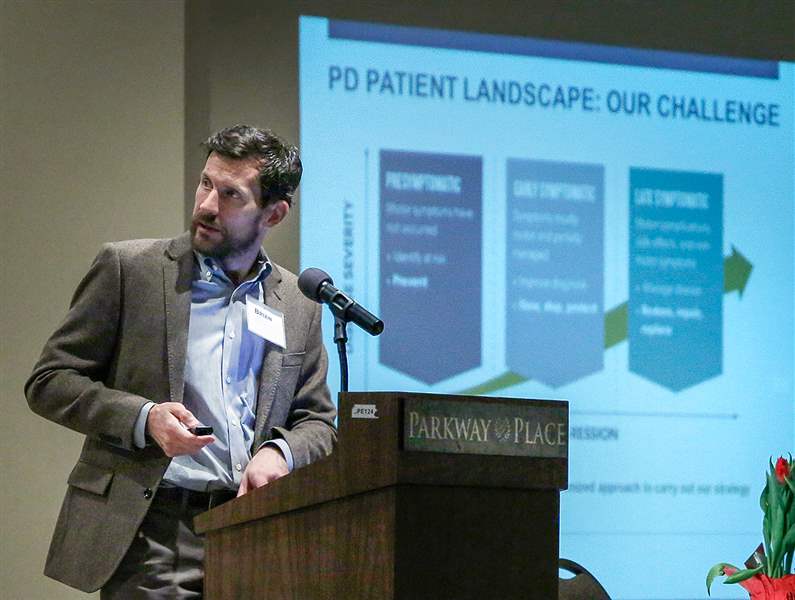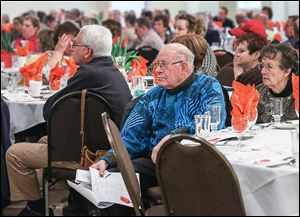
Parkinson’s symposium offers support, treatment approaches
4/6/2014
Dr. Brian Fiske speaks during the 17th annual Parkinson’s Disease Symposium at Parkway Place in Maumee. Dr. Fiske delivered the keynote presentation at the event.
THE BLADE/LORI KING
Buy This Image

Dr. Brian Fiske speaks during the 17th annual Parkinson’s Disease Symposium at Parkway Place in Maumee. Dr. Fiske delivered the keynote presentation at the event.
A Parkinson’s disease expert told hundreds of area patients and their family members who gathered in Maumee on Saturday to have hope in the light of the latest developments in the disease treatment research and called on them to seek information about new treatments and ways to participate in clinical trials.
“The Parkinson’s therapy pipeline [right now] is one of the most exciting I’ve seen over several years,” Dr. Brian Fiske said in summation of his keynote presentation as he stepped off the podium. “People with Parkinson’s should be hopeful about the new treatments that are starting to come to the clinic or are in the clinical testing stage.”
Dr. Fiske was the keynote speaker at the 17th annual Parkinson’s Disease Symposium themed “Today’s Research, Tomorrow’s Hope,” which was held at Parkway Place, 2592 Parkway Plaza.
“There are a variety of approaches and multiple drugs,” Dr. Fiske said during his 60-minute presentation. “... There are lots of drugs and lots of ideas moving into clinical testing phases.”
Dr. Fiske is the vice president of research programs for the Michael J. Fox Foundation for Parkinson’s Research, where he manages a team of researchers to help accelerate research and drug development for the disease. Since 2000, the foundation has funded more than $450 million to speed finding a cure for Parkinson’s disease, according to event organizers.
Topics covered by Dr. Fiske included developments in Parkinson treatment research, new treatments, and new clinical research studies available.
“It’s been very informative and promising,” Barbara Harris, 66, of Tiffin said of the presentation. “I think Dr. Fiske gave very good information.”
Ms. Harris, a retired paralegal who was diagnosed with Parkinson’s in 2002, said she had already participated in two clinical trials and that based on what she had heard from Dr. Fiske, she will participate in a clinical trial “anytime,” if she qualifies.
Dennis Ploszaj, 65, of Findlay, who was diagnosed in 2005, sounded just as optimistic about clinical trials after hearing the presentation.

Tiffin residents Kenny Dininger, center, and Imelda Dininger, right, attend the 17th annual Parkinson’s Disease Symposium at the Parkway Place in Maumee.
“I’ve been participating in as many clinical trials as I can,” said Mr. Ploszaj, a retired facilities manager. “It has been definitely helpful — not only for me but also for the clinicists. Some of the trials have slowed the progress of the disease.”
Dr. Fiske told the audience that Parkinson’s patients play an important role in their own care and in the development of new therapies and that participating in clinical studies is important for helping oneself and helping others diagnosed with the disease.
“The treatment of Parkinson’s disease is quite individualized, so it is extremely important for patients to keep up-to-date with the latest research and treatment options to meet our goal of making this disease as insignificant as possible in their lives,” said Dr. Lawrence Elmer, professor of neurology and director of the Gardner-McMaster Parkinson Center at the University of Toledo, who introduced Dr. Fiske.
Drugs discussed at the event included an extended duration medication that contains levodopa that is awaiting FDA approval, and research into a drug that provides benefits similar to high doses of caffeine for controlling Parkinson’s symptoms, but without the stimulant effects of caffeine, according to Dr. Elmer.
Developed in the late 1960s, levodopa was the first medication proven effective in treating chronic neurodegenerative diseases like Parkinson’s, according to the National Parkinson Foundation Web site. The drug in pill form is absorbed in the blood from the small intestine and travels through the blood to the brain, where it is converted into dopamine, which is then stored in the neurons until the body uses it for movement.
Levodopa remains “the single most effective agent in the management of Parkinson’s symptoms,” the Web site states.
The symposium was presented by the Gardner-McMaster Parkinson Center at the University of Toledo and by the Parkinson Foundation of Northwest Ohio with support from the Michael J. Fox Foundation and Teva Pharmaceuticals.
Contact Mike Sigov at: sigov@theblade.com, 419-724-6089, or on Twitter @mikesigovblade.